The couple who helped transform the way we shop
- Published
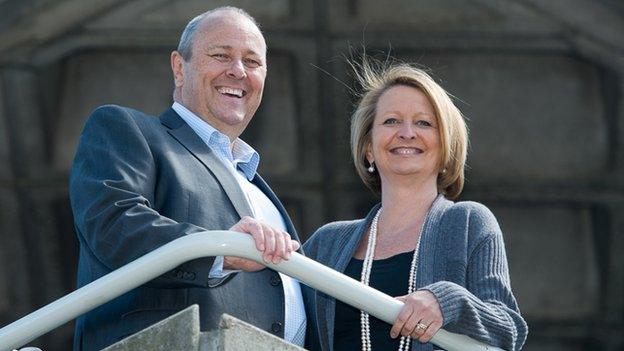
The couple have been married for 32 years after first meeting when working in the same office
As the owners of a small business with just 30 members of staff, Edwina Dunn and her husband Clive Humby shouldn't have been in Tesco's boardroom.
Yet back in 1994 they had been invited to give a presentation to Tesco's directors.
What Ms Dunn and Mr Humby said that day enabled the supermarket group to double its market share in little more than a year, transformed the way many of us shop, and ultimately made the couple multimillionaires.
After they had finished their presentation, an awkward silence followed for more than a minute.
This was eventually broken by Tesco's then chairman, Lord MacLaurin, who made a remark that has gone down in the supermarket's folklore: "What scares me about this is that you know more about my customers after three months than I know after 30 years."
So what was the secret of Ms Dunn and Mr Humby's presentation?
They had shown the Tesco board that their tiny business had the software and skills to do something the supermarket group hadn't been able to do for itself - work out almost exactly what Tesco's customers were buying.
Ms Dunn, now 56, says: "It was the defining moment."
Tesco quickly gave the couple a long-term contract and used their expertise to launch the Tesco Clubcard, the world's first supermarket loyalty card.
Division of labour
Ms Dunn and her husband had set up their business four years earlier, in the kitchen of their home in Chiswick, west London.
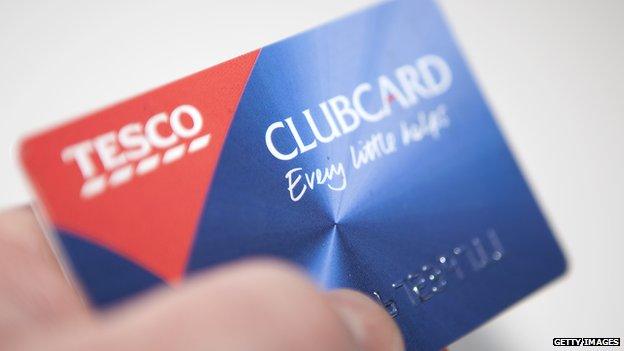
Tesco's Clubcard was an immediate success with shoppers
Called Dunnhumby, it was one of the first companies in the UK dedicated to analysing data to best work out the spending patterns of consumers.
Building on work the couple had previously done while both employed at the UK arm of a American software business (where they had first met and married after just one year), Ms Dunn and Mr Humby had a clear division of labour.
He was the software and data expert, and she was the chief executive who would look after the day-to-day running of the business.
Their first client was UK food wholesaler, Booker.
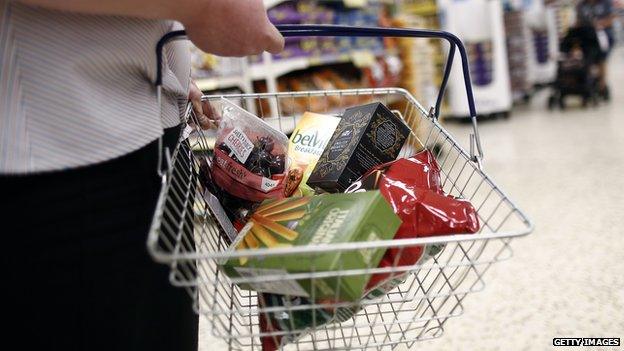
Dunnhumby was able to let Tesco find out exactly what customers were buying
Studying Booker's sales in depth, they were able to advise the company on exactly what its customers were buying, allowing Booker to improve its distribution network.
Thinking about this these days, many might question why Booker wasn't already doing this itself. But back in 1990 no national retailer was properly collecting and analysing its sales data.
Retailers at the time obviously knew how much they were selling of a particular product, but the key point is that they did not know what combination of items consumers were typically buying. Dunnhumby was able to provide this information.
"The thing to remember is that data was thrown away in those days... there was no such thing as data mining or data profiling, this was all new," says Ms Dunn.
Selling data
In 1994 a senior manager at Tesco got in touch with Dunnhumby because the supermarket giant wanted to launch a loyalty card.
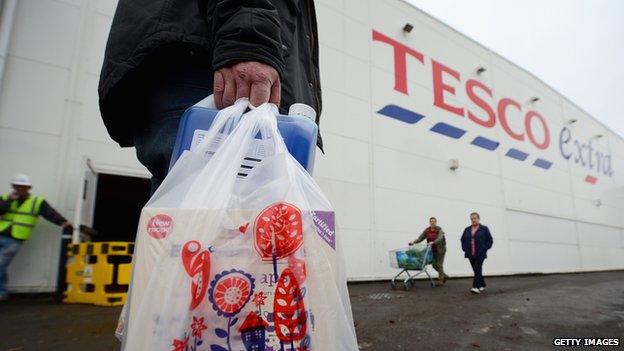
The Clubcard helped Tesco establish itself as the UK's largest supermarket group
The card would give customers special offers and money-off coupons, in return for Tesco finding out a lot more about what people were buying. Only the company was having difficulty dealing with all the data.
"They were struggling with their pilot, there was just so much data that they couldn't manage it," says Ms Dunn. "Remember that computers were not what they are today.
"So we were invited in to look at their data, and told not to get too excited, as it would only be one-off."
It was the start of a 16-year working relationship between Tesco and Ms Dunn and Mr Humby.
Thanks to Dunnhumby's help, Tesco was able to successfully pilot its Clubcard across nine stores in 1994, and then launch it nationwide a year later.
Ms Dunn explains how Dunnhumby was able to make the data work: "We brought in a statistician's mindset, which was 'some of the data, some of the time'. That is what the technology people at the time didn't grasp."
So she says that while Tesco had been trying to analyse 100% of consumer data, a giant task that was near impossible at the time and very expensive, Dunnhumby was able to show that they could instead just study a 10% sample and still achieve between 95% and 99% accuracy.
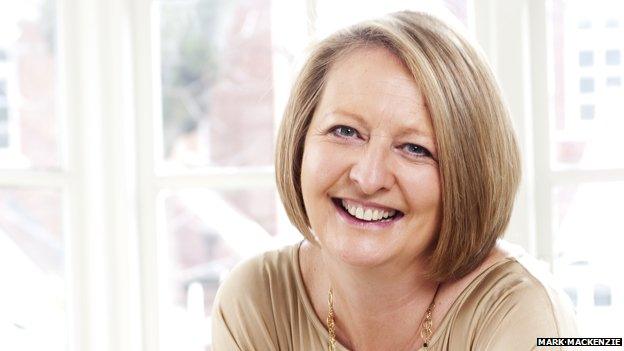
Ms Dunn says she and her husband have clearly defined roles so as not to overlap
"When Tesco asked its IT department how long, and how much to do the [nationwide] roll out, they said three years and £50m," says Ms Dunn.
"We said £250,000 and 10 weeks."
The launch of the Clubcard was an immediate hit with Tesco's customers, with millions of people signing up, tempted by the promise of money-off coupons, and special offers that the supermarket group had arranged with the big brand owners, such as Coca-Cola and Nestle.
In just over a year it enabled Tesco to overtake Sainsbury's and become the UK's largest retailer.
But how exactly did Dunnhumby make millions of pounds from its contract with Tesco?
Firstly Tesco paid it an annual fee, but more importantly - and much more lucratively - Dunnhumby got a share of the money Tesco started to receive from selling to the likes of Coca-Cola the vast amount of consumer data it was now collecting.
Exit plan
Ms Dunn describes the start of the working relationship with Tesco as an "amazingly intense phase".
Dunnhumby's workforce "immediately" went from 30 to 70, and then continued to more than double every year.
"That was the fastest we could grow, it was our maximum capacity, as we couldn't hire and train enough people," she says.

Ms Dunn and her husband are now studying celebrities such as Rihanna on social media
With Tesco's blessing, Dunnhumby was soon signing similar deals with supermarket groups around the world, and then in 2002, Tesco bought a 53% stake in the business.
In 2010, Ms Dunn and Mr Humby eventually sold the remainder of the business to Tesco, pocketing a widely reported £93m in total.
Ms Dunn says: "It had always been our intention to ultimately exit the business, and we had come to the end of business plan. We had exceeded our numbers, and Tesco gave us more than they had promised.
"They were happy, and we were happy. And we were tired actually... I just needed a rest."
Yet after six months of relaxation in the Caribbean and Mediterranean, Mr Humby and Ms Dunn were keen to start working again.
And so a year ago, they joined a start-up business called Starcount, which aims to study which celebrities people follow on social media, and then sell on the useful information.
"Brands need to know what [and who] people really love. Only then can they introduce their brands in a way which feels relevant and personal."
Ms Dunn happily admits that Starcount is yet to make money, but earlier this year she helped it to secure multi-million pound investment.
And while she doesn't comment on Tesco's recent woes - the supermarket group revealed in September that it had overstated its profit guidance - Ms Dunn says she hopes it will continue to be committed to its Clubcard.
Follow Will Smale on Twitter @WillSmale1, external